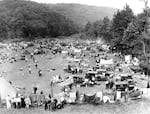
This is a general view of the new camp of the bonus-seeking veterans' camp at Johnstown, Pa., July 31, 1932 when more than 3,000 veterans, their wives and children were encamped there. At the same time efforts were being made toward establishing a permanent camp in Maryland by Commander Walter Waters.
Courtesy Associated Press / File
In the summer of 1932, ten of thousands of veterans — many with their families in tow — gathered in Washington, D.C. to ask the government for money promised to them around seven years earlier.
It was a historic moment, one with an Oregonian at the helm.
It was the height of the Great Depression, and like millions of other Americans, many veterans were out of work and struggling to make ends meet.
Congress had voted in 1924 to give World War I veterans their service bonus certificates, known simply as “bonuses.” These bonuses weren’t set to be paid until 1945, but with many veterans at pains to access basic needs, an increasing number began demanding that money immediately.
At the center of it all was Walter Waters, a Portland resident who served in France during the First World War. Having grown up in Burns in Central Oregon, Waters had worked a series of odd jobs following the war, often coming across other veterans who couldn’t find consistent work.
He and 400 other veterans from Portland traveled by train in May 1932 to Washington D.C., with plans to ask the federal government to pay them their bonuses early. The group became known as the Bonus Army. Portland was seen by many as the epicenter of a nationwide movement.
Jeffrey LaLande, who taught history at Southern Oregon University and has written about the Bonus Army, said Waters’ charismatic personality attracted widespread media attention and soon made him the face of a national news story.
While people from all over the country were traveling to the nation’s capital, articles about Walters convinced thousands of others to do join.
“He was just kind of the right person at the right place at the right time,” LaLande said. “He fulfilled that kind of vacancy of the need for a charismatic leader.”
Waters ran his group of veterans much like a military unit. He wore a khaki uniform and served as the de facto spokesman for the group.
When the soldiers arrived in Washington, many also brought their entire families. They set up camps around the city, many resembling the “Hooverville” shanty towns that became commonplace during the Depression.
After two months, with the Bonus Army’s efforts sputtering, President Herbert Hoover cracked down on the camp. He sent in the military on July 28 and the removal soon became violent, as clashes broke out between the soldiers and the veterans.
Soldiers killed two veterans that day, and the camps lining the banks of the Anacostia River were torn apart and burned to the ground.
The fallout from the violence that day lingered for years afterward. Hoover lost his reelection campaign later that year to Franklin Roosevelt, in no small part because of his decisions surrounding the Bonus Army, LaLande said.
“It was so dramatic — it left a kind of an indelible impression on many, many people who were going to vote in 1932,” LaLande said.
The veterans would eventually receive their bonus — which LaLande said ranged from $500 to $600 — four years later in 1936. That would amount to between $11,000 and $13,000 per person in 2023.
Following their removal from Washington D.C., Waters soon lost control of his Bonus Army. He eventually joined the Navy in the 1940s before fading into obscurity. He died in 1959.
